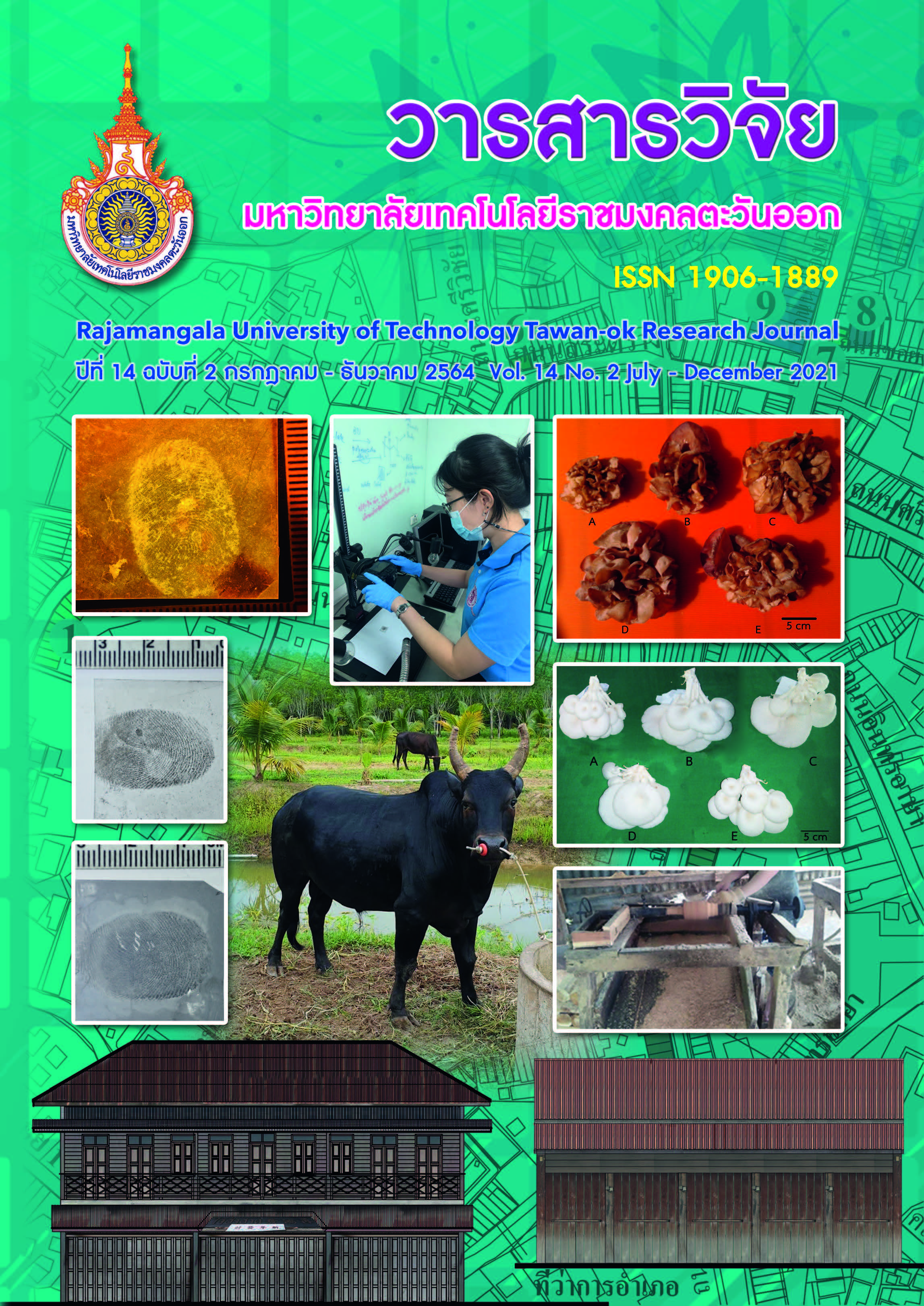ผลของการเสริมแอลคาร์นีทีนต่อค่าโลหิตวิทยาและชีวเคมีในเลือดของโคชน
Main Article Content
บทคัดย่อ
การวิจัยครั้งนี้มีวัตถุประสงค์เพื่อศึกษาผลการให้สารเสริมแอลคาร์นีทีนต่อการเปลี่ยนแปลงของค่าโลหิตวิทยาและค่าชีวเคมีในเลือดในโคชนเพศผู้ โดยการศึกษาครั้งนี้ใช้โคชนเพศผู้ อายุ 3-5 ปี จำนวน 16 ตัว และถูกแบ่งออกเป็นสองกลุ่มการทดลอง ได้แก่ กลุ่ม LC (n = 8) ซึ่งโคชนกลุ่มนี้จะได้กินแอลคาร์นีทีน ขนาด 500 มิลลิกรัมต่อตัวต่อวัน และกลุ่มควบคุม (n= 8) โคชนกลุ่มนี้จะได้รับยาหลอกเป็นแคปซูลแป้ง โดยมีระยะเวลาการทดลองเป็นเวลา 8 สัปดาห์ ตัวอย่างเลือดถูกเก็บจากหลอดดำที่คอเพื่อนำไปตรวจค่าโลหิตวิทยา ส่วนซีรั่มนำไปตรวจหาค่าชีวเคมีในเลือด ผลการศึกษาพบว่าโคชนที่ได้กินแอลคาร์นีทีนเป็นระยะเวลา 2 เดือนมีปริมาณฮีโมโกลบิน และเม็ดเลือดขาวชนิดแกรนูโลไซต์สูงกว่า (p < 0.05) แต่จำนวนเม็ดเลือดขาวชนิดลิมโฟไซต์มีจำนวนต่ำกว่าโคชนในกลุ่มควบคุมอย่างมีนัยสำคัญทางสถิติ (p < 0.01) ส่วนค่าชีวเคมีในเลือดไม่พบความแตกต่างระหว่างกลุ่มที่ได้รับแอลคาร์นีทีนกับกลุ่มควบคุม การศึกษานี้บ่งชี้ว่าการเสริมแอลคาร์นีทีนในโคชนเพศผู้มีผลต่อการสร้างฮีโมโกลบิน ซึ่งส่งผลให้มีการขนส่งออกซิเจนไปยังเซลล์ต่างๆ ได้ดี และมีผลต่อระบบภูมิคุ้มกันของร่างกายโดยกระตุ้นให้เม็ดเลือดขาวชนิดแกรนูโลไซต์ซึ่งเกี่ยวข้องกับกระบวนการอักเสบ รวมถึงไม่ก่อให้เกิดความเป็นพิษต่อร่างกายของโคชน เนื่องค่าชีวเคมีในเลือดที่เกี่ยวข้องกับการทำงานของตับและไตอยู่ในระดับปกติ ดังนั้นแอลคาร์นีทีนสามารถนำไปใช้เป็นอาหารเสริมสำหรับโคชนได้
Article Details
เอกสารอ้างอิง
Balercia, G., Regoli, F., Armeni, T., Koverech, A., Mantero, F. and Boscaro, M. 2005. Placebo-controlled double-blind randomized trial on the use of L-carnitine, L-acetylcarnitine, or combined L-carnitine and L-acetylcarnitine in men with idiopathic asthenozoospermia. Fertility and sterility, 84(3), 662-671.
Elgazzar, U. B., Ghanema, I. I. A. and Kalaba, Z. M. 2012. Effect of dietary L-carnitine supplementation on the concentration of circulating serum metabolites in growing New Zealand rabbits. Australian Journal of Basic and Applied Sciences, 6(2), 80-84.
Gani F, Passalacqua G, Senna G and Mosca Frezet M. 2003. Sport, immune system and respiratory infections. Allerg Immunol (Paris); 35:41
Giardina, B., Messana, I., Scatena, R. and Castagnola, M. 1995. The multiple functions of hemoglobin. Critical reviews in biochemistry and molecular biology, 30(3), 165-196.
Hurot, J. M., Cucherat, M., Haugh, M. and Fouque, D. 2002. Effects of L-carnitine supplementation in maintenance hemodialysis patients: a systematic review. Journal of the American Society of Nephrology, 13(3), 708-714.
Iben, C., Moschitz, E. and Fehleisen, B. 1999. Effect of smallcap˜ L-carnitine supplementation on heart rate and some blood parameters in the eventing horse. Wiener Tierärztliche Monatsschrift, 86(10), 330-338.
İzgüt-Uysal, V. N., Ağaç, A. and Derin, N. 2003. Effect of L-carnitine on carrageenan-induced inflammation in aged rats. Gerontology, 49(5), 287-292.
Kalantar-Zadeh, K., Anker, S. D., Horwich, T. B. and Fonarow, G. C. 2008. Nutritional and anti-inflammatory interventions in chronic heart failure. The American journal of cardiology, 101(11), S89-S103.
Karlic, H. and Lohninger, A. 2004. Supplementation of L-carnitine in athletes: does it make sense?. Nutrition, 20(7-8), 709-715.
Meyer, J., Daniels, S. U., Grindler, S., Tröscher-Mußotter, J., Alaedin, M., Frahm, J. and Dänicke, S. 2020. Effects of a Dietary L-Carnitine Supplementation on Performance, Energy Metabolism and Recovery from Calving in Dairy Cows. Animals, 10(2), 342.
Pirestani, A. and Aghakhani, M. 2018. The effects of rumen-protected choline and l-carnitine supplementation in the transition period on reproduction, production, and some metabolic diseases of dairy cattle. Journal of Applied Animal Research, 46(1), 435-440.
Pirestani, A., Aghakhani, M., Tabatabaei, S. N., Ghalamkari, G. and Baharlo, F. 2011. Effects of dietary L-carnitine and choline chloride compound on reproduction indices and udder immune system in Holstein dairy cattle. In Proceedings of international conference on life Science and Technology (pp. 59-61).
Rivero, J. L., Sporleder, H. P., Quiroz‐Rothe, E., Vervuert, I., Coenen, M. and Harmeyer, J. 2002. Oral L‐carnitine combined with training promotes changes in skeletal muscle. Equine Veterinary Journal, 34(S34), 269-274.
Rubin, M. R., Volek, J. S., Gómez, A. L., Ratamess, N. A., French, D. N., Sharman, M. J. and Kraemer, W. J. 2001. Safety measures of L-carnitine L-tartrate supplementation in healthy men. Journal of strength and conditioning research, 15(4), 486-490.
Şener, G., Ekşioğlu-Demiralp, E., Cetiner, M., Ercan, F. E. R. İ. H. A., Şirvancı, S., Gedik, N. and Yeğen, B. C. 2006. L-Carnitine ameliorates methotrexate-induced oxidative organ injury and inhibits leukocyte death. Cell biology and toxicology, 22(1), 47-60.
Uluisik, D. and Keskin, E. 2014. The effects of L-carnitine on some hematological parameters in rats fed a cholesterol-rich diet. Biotechnic & Histochemistry, 89(5), 393-397.


